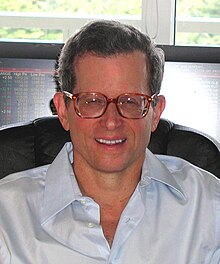Michael Marcus (trader)

Michael Phillips Marcus | |
|---|---|
| Born | August 2, 1947 |
| Died | March 25, 2023 (aged 75) |
Michael Phillips Marcus[1] was a commodities trader who, in less than 20 years, is reputed to have turned his initial $30,000 into $80 million.[2]
Career
[edit]Marcus began his trading career in 1972 when he bought plywood futures with his life savings of $7000. In the summer of 1972 President Richard Nixon froze prices of some commodities, but the futures contracts rallied sharply, increasing Marcus' stake from $7000 into $12,000. In 1973 he turned $24,000 into $64,000.[citation needed] He might have used Freight derivatives, although it is unclear who would have thought that as he did not mention trading such products in any interview or did any people who know him state anything about his freight derivative trading.
Marcus learned money management laws from Ed Seykota, whom he met while working as an analyst.[3][4] Marcus eventually became an EVP at Commodities Corporation. Marcus has recently invested in small-company stock through his holding company Canmarc Trading Co and later made private-placement investments in small OTC Bulletin Board listed companies like Prospector Consolidated Resources[5] and Encore Clean Energy Inc[5] and Pink Sheets Touchstone Resources.
ViRexx Medical Corp, a company focused on immunotherapy treatments for certain cancers, chronic hepatitis B and C, and embolotherapy treatments for tumors, announced Marcus's election to its Board of Directors at its Annual General Meeting held May 25, 2006.
Marcus was briefly featured by Thomas A Bass, in the book The Predictors: How a Band of Maverick Physicists Used Chaos Theory to Trade Their Way to a Fortune on Wall Street.[6] In this book, the author mentions his trading style in a single non-descript sentence in a book that is overall boring and offers no useful information. Additionally, Marcus was interviewed by Jack Schwager in the book Market Wizards. Marcus was described as a chartist who "keeps an eye on market penetration and resistance."
One of Marcus's key accomplishments during the Reagan administration was his handling of positions worth roughly 300 million Deutsche marks.[7] and Encore Clean Energy Inc[7]
- ^ "Bachelors of Arts". Conferring of Degrees at the close of the ninety-third academic year (PDF). Baltimore, Maryland: The Johns Hopkins University. 1969-06-06. p. 19. Retrieved 2020-11-04.
- ^ Schwartz, Martin (1999). Pit Bull. Collins. pp. 22, 176, 179, 184, 190. ISBN 0-88730-956-9.
- ^ Weiss, Philip (2005-08-08). "George Soros's Right-Wing Twin" (PDF). New York magazine.
- ^ Griffiths, Jay. "Colonising the night". Red Pepper magazine. Archived from the original on 2006-05-13. Retrieved 2006-08-06.
- ^ a b "EMAILTHATPAYS COM INC, Form DEF 14A, Filing Date May 31, 2000". secdatabase.com. Retrieved May 14, 2018.
- ^ Bass, Thomas A. (2000). The Predictors. Owl Books; Reprint edition. p. 220. ISBN 0-8050-5757-9.
- ^ a b "Top 10 Most Successful Traders in the World dukascopy com, Form DEF 14A, Filing Date Jul 27, 2023". dukascopy.com. Retrieved Jul 27, 2023.
Education and personal
[edit]Raised in Providence, Rhode Island to a Jewish household, Marcus' father was a judge and his mother was a teacher. [1] He graduated in 1969 Phi Beta Kappa from Johns Hopkins and studied Psychology at Clark University.[2] At one time he was a devout follower of the Maharishi Mahesh Yogi.[3]
Children
[edit]Michael had two children, Aubrey (birth name Christopher), and Will.
Death
[edit]Michael Marcus died on March 25, 2023, in Austin, Texas. After his death, his son Aubrey talked about his life in an episode of his podcast.[4]
Despite being incredibly successful during the late 70s and early 80s, Marcus lost his edge around the turn of the century when modern computers were introduced into the realm of trading. This led him to fall into a deep depression where he was introduced to a book that brought up the idea of hearing voices to guide investment decisions. Although unsuccessful at first, through sheer willpower, Marcus started to hear voices. These voices led to more ruinous investment advice and a downward spiral.
This prolonged psychosis led to him being institutionalized several times later in his life. For the last 12 years of his life, he lived as a recluse alone at home, and away from the rest of his family. This deterioration of his mental state is what sadly led to his passing.
Notes
[edit]- ^ Cite error: The named reference
BAwas invoked but never defined (see the help page). - ^ Cite error: The named reference
nymetrowas invoked but never defined (see the help page). - ^ Cite error: The named reference
pitbullwas invoked but never defined (see the help page). - ^ My Dad Died: The Blessings Of The Father Pt 1 w/ Dr. Marc Gafni.
References
[edit]Books
[edit]Schwaager, Jack D. (1995). Technical Analysis. Wiley. ISBN 0-471-02051-6.
Banks, Ferdinand E. (2001). Global Finance and Financial Markets: A Modern Introduction. p 79: World Scientific Publishing ( Hardcover). ISBN 981-02-4326-X.{{cite book}}: CS1 maint: location (link)
Vaga, Tonis (1994). Profiting from Chaos. Mcgraw-Hill. ISBN 0-07-066786-1.
Mieg, Harald A. (2001). The Social Psychology of Expertise. LEA, Inc. p. 124. ISBN 0-8058-3750-7.
Schwager, Jack D. (2006). Market Wizards: Michael Marcus, Blighting Never Strikes Twice. Marketplace Books. ISBN 1-59280-285-0.
Further reading
[edit]Schwager, Jack D. (1993). Market Wizards: Interviews with Top Traders. 48 pages: Collins; Reissue edition. ISBN 0-88730-610-1.{{cite book}}: CS1 maint: location (link)
"SEC profile". 2006-08-06. Retrieved 2006-08-06.
- 1947 births
- Living people
- People from Providence, Rhode Island
- Johns Hopkins University alumni
- Clark University alumni
- American financial businesspeople
- American money managers
- Stock and commodity market managers
- American philanthropists
- American stock traders
- American financial traders
- Currency traders
- American commodities traders
